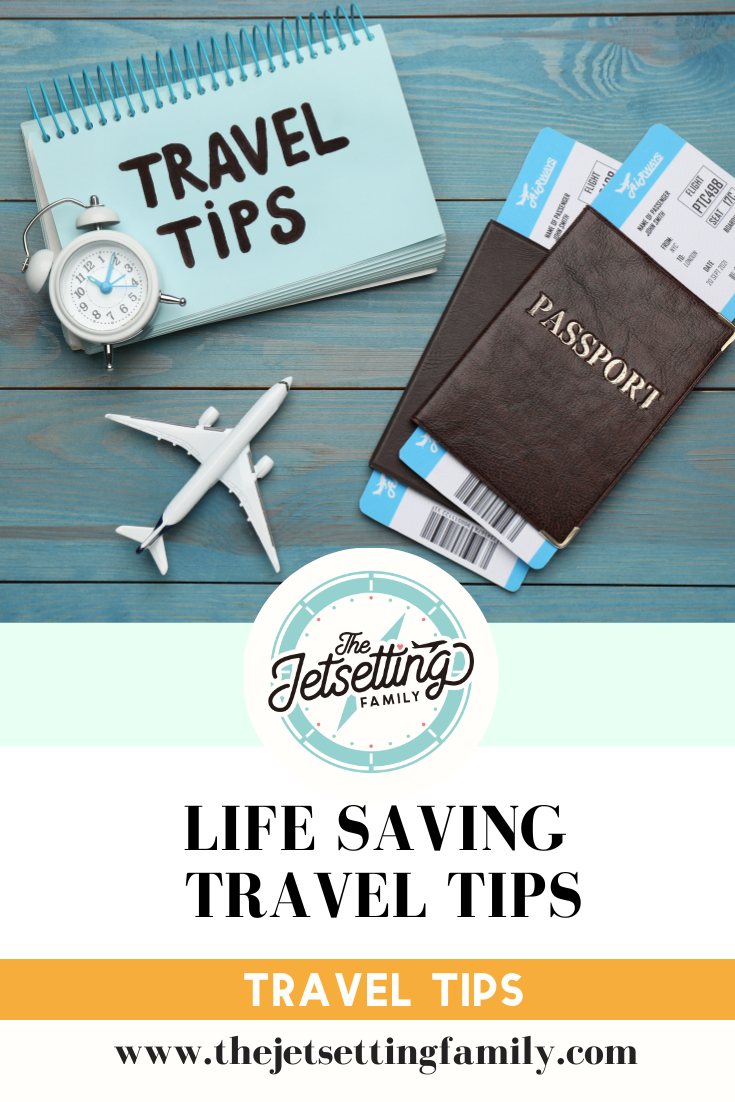When you are planning a vacation, the last thing you want to worry about is an emergency situation. Vacations are a time to be carefree and relaxed, and nobody wants to think of potential difficulties. But since life is unpredictable, it’s always best to be prepared in case of an emergency. Fortunately, there are steps you can take to ensure you’re prepared before you take off, so when any surprises arise (hopefully nothing too pesky!), you can enjoy carefree travel bliss. So whether you’re traveling with kids or not, these life saving travel tips are something you definitely don’t want to overlook.
Note: These tips may seem excessive, but we experienced 2 emergency situations during our travels when an ambulance had to be called and learned the hard way. You definitely we want to be prepared even when emergencies are unlikely.

Learn the local emergency number
When traveling, particularly abroad, one of the most important things to do is to learn the local emergency number. This can be a lifesaver if you find yourself in unexpected trouble or facing an emergency situation. Emergency numbers vary around the world – for example, the US uses 911, while Australia uses 000 and France uses 112. Knowing the right number to call can make all the difference when dealing with a critical or worrying situation. Make sure that before you head off on your next journey, you take a moment to look it up beforehand!
Familiarize yourself with your phone’s SOS feature
Another option is to familiarize yourself with your phone’s SOS emergency feature. Almost all available phones now come with an SOS feature, making it easy to contact emergency services in a time of need. Take a few minutes today to research how this feature works. Knowing how to use your phone’s SOS feature can be an absolutely life-saving tool in times of dire situations. This feature, which is found in almost all phones and can be activated with the press of a button, allows you to quickly call emergency services in desperate situations that happen on the road. Not only that, but many smartphones have additional safety features such as location sharing and automatic notifications informing loved ones when SOS calls are made. This makes it even more of an invaluable resource for anyone on the go. A few minutes spent learning about this lifesaving technology could prove successful if you ever find yourself in need it.
It’s also a good idea to have your emergency contact information and medical information stored in your phone. Many phones have the option now to store this information in a manner that is accessible by others even when the phone is locked. This is extremely important for solo travelers.
Write down your local address
Always make sure you write down the address of where you will be staying. Things can get blurry quickly and when trouble strikes, it helps immensely to have your accommodation details on hand. Just tuck it away somewhere easy to find in case emergency help is needed. The last thing you want is to be on the line with emergency support while trying to look up your exact address in an Airbnb or VRBO app. This small yet potentially lifesaving precaution should definitely make its way onto your travel “must-do” list!
Know possible natural disasters and evacuation routes
Knowing what types of disasters can occur in a particular region, along with their respective countermeasures and safety protocols, is incredibly valuable. The availability of evacuation routes and designated meeting points should be considered essential departure info that every traveler needs to familiarize themselves with. It’s even more important if that destination is prone to earthquakes, tsunamis or hurricanes. While these events are rare, being equipped with knowledge on how to respond could prove to be life-saving. So take a few moments before leaving to map out potential hazards as well as safe havens for when unforeseen circumstances arise.
Our family experienced several earthquakes throughout our travels and quickly learned how important it was to keep an evacuation plan in mind.
Learn how to say “help” in the local language
When traveling to a new country, it is important to remember that the local language may be different than what you’re used to. While learning lots of phrases in the local language can help you get around and make your experience more authentic, the one word you should never forget is ‘help.’ Knowing how to ask for help in an emergency or when lost can be invaluable. Ensure you learn the phrase for ‘help’ in the local language and keep it written down somewhere accessible – this small task could end up making all the difference on your travels!
Research local hospitals
Planning for a medical emergency can be overwhelming, but it’s important to take the time to make sure you’re prepared. One way to ensure that your healthcare needs are met is to research local hospitals and choose where you would want to go in the event of an emergency. Taking into consideration the location, facilities, and doctors available can help you make an informed decision, so that no matter what happens, you have peace of mind that you know where to go when it counts. Knowing who will accept your health insurance ahead of time can often times make all the difference. So check out some local hospitals today and rest easy knowing who will be taking care of you in case of a healthcare emergency.
Safe Travels
As much as one wants to explore and travel the world, it is always important to keep safety at the top of your list. By simply learning a few numbers, addresses, phrases, and researching a bit of local geography can help to ensure you are prepared in the unlikely event you need help. So go ahead and take that trip you’ve been dreaming about, book your flights and hit the ground running. But don’t forget to make safety your number one priority when traveling by implementing these lifesaving travel tips!













